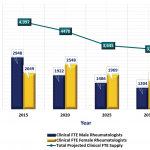
Who will take care of my patients when I retire? As a clinician with an established rheumatology practice, I’ve found myself asking this question more frequently in recent years, and academic rheumatologists are the key to answering it. To solve some workforce issues—like who will take over my practice—we need a larger supply of training programs, quality trainees to enter the programs, and academic rheumatologists prepared to teach.
The Rheumatology Workforce
The ACR’s 2006 Rheumatology Workforce Study, which was completed by The Lewin Group, found that the median age of adult rheumatologists in 2005 was 51. These doctors are in their most productive working years now, but are set to retire within the next 15 to 20 years. Although 94% of these physicians currently treat patients, the size of the overall patient population has grown dramatically in recent years. In many areas, rheumatologists are already having difficulty keeping up with demand for their services. Demand promises to increase even more as the large baby-boomer generation ages and requires more rheumatology care. While the demand for rheumatologists’ services is projected to increase by 46% over the next 20 years, the number of practicing adult rheumatologists is projected to remain relatively flat, increasing by only 1.2% during the same period. Pediatric rheumatology doesn’t face quite as steep a challenge in the coming years because a parallel surge in the patient population is not expected, but the trend toward excess demand is still there.
Training Future Clinicians
One way to mitigate this excess demand is to expand the number of rheumatology training programs and fellowship positions, which would increase the supply of rheumatologists. Some progress is being made in this area. Over the past five years, an average of 150 rheumatology fellows have completed adult training programs each year, compared with an average of 115 fellows completing these programs each year over the previous five-year period.
But to attract and train new clinicians and researchers, training programs require skilled academic rheumatologists who are committed to rheumatology training, patient care, and research. Without this faculty, the recent growth in rheumatology training programs cannot be maintained. In a February 2007 report on the state of the rheumatology training environment, the ACR Committee on Training and Workforce Issues noted: “Academic rheumatology programs must successfully engage in a variety of inter-related but distinct activities to provide a quality, stable, and accredited fellowship program. These activities include clinical care, education, and research. The success of each of these activities is first and foremost dependent upon the presence of qualified academic rheumatology faculty.”



